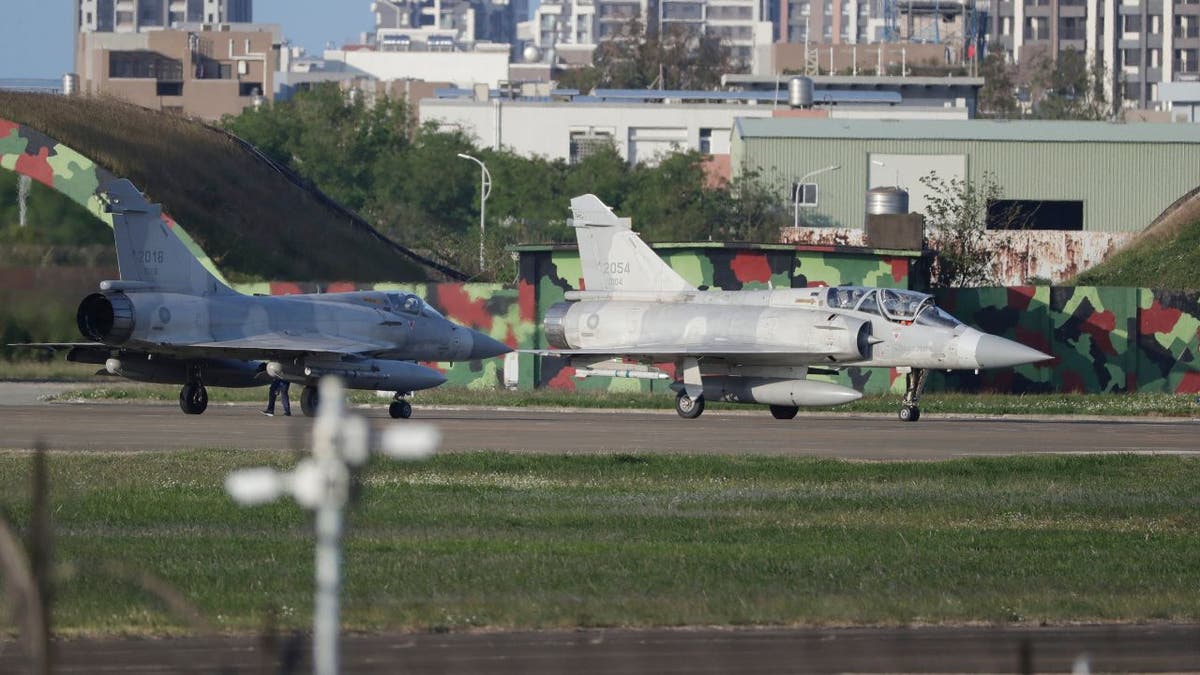Chinese military makes massive deployment around Taiwan to send ‘very simple’ message

Taiwan defense officials are raising concerns about a substantial deployment of Chinese naval ships and military planes in the past 24 hours, saying the build-up could eventually lead to war as tensions continue to rise in the area.
Officials say China has sent about a dozen ships and 47 military planes to regional waters around the Taiwan Strait, as the nation braces for military drills following Taiwanese President Lai Ching-te’s recent overseas trip that included visits to Hawaii and Guam, an American territory.
The trip angered China, which claims Taiwan as its own.
A Taiwan fighter jet lands at an airbase in Hsinchu, northern Taiwan, on Dec. 10, 2024. Right: Chinese President Xi Jinping. (AP Photo/Chiang Ying-ying, left; Lintao Zhang/Getty Images, right.)
TRUMP CABINET PICKS DELIGHT TAIWAN, SEND STRONG SIGNAL TO CHINA
Lai, who has been in office since May, spoke with U.S. congressional leaders by phone while in Guam.
The visits came just weeks after the U.S. approved a potential $2 billion arms sale package to Taiwan, including the delivery of an advanced air defense missile system battle tested in Ukraine and radar systems. The potential sales package includes three National Advanced Surface-to-Air Missile Systems (NASAMS) and related equipment valued at up to $1.16 billion, according to the State Department’s Bureau of Political-Military Affairs.
The Chinese communist government has pledged to annex Taiwan, through military force if necessary, and sends ships and military planes near the island almost daily.
Regarding the latest build up, Taiwan’s Lt. Gen. Hsieh Jih-sheng said China’s navy is creating two walls — one at Taiwan’s perimeter and another outside the first island chain, which extends south from Japan and through Taiwan to the Philippines.
“The message they are sending is very simple: The Taiwan Strait is ours,” he said, referring to the waters between Taiwan and China.
Taiwan officials say the deployment came without an announcement and are calling the ongoing activity a training exercise.
However, Hsieh warned that training can become drills, and drills can become war.
“It’s in the status of regular training,” he said. “But under the status of normalized training, it’s able to mobilize military forces on such a large scale and carry out exercises in such a large area.”
Taiwan’s military is on high alert, setting up an emergency response center on Monday and announcing flight restrictions in seven zones off China’s east coast. The restrictions are in place until Wednesday.
PHILIPPINES WARNS OF ‘RED LINE’ WITH BEIJING AMID HEIGHTENED TENSIONS IN SOUTH CHINA SEA

Taiwan’s fighter jets prepare to take off at an airbase in Hsinchu, northern Taiwan, Tuesday as Taiwan’s Defense Ministry said it detected Chinese naval ships and military planes engaged in training. (AP Photo/Chiang Ying-ying)
The U.S. has repeatedly signaled its support for Taiwan through military deals, operations and diplomatic interactions with Taiwanese officials.
Recent years have found a cadence of U.S. officials, such as former Speaker Nancy Pelosi, meeting with Taiwanese officials only for Beijing to react with saber-rattling.
Pelosi made a rare trip to the island in 2021, and China reacted by holding live-fire military drills surrounding Taiwan. Those drills occurred again in 2023 when then-Taiwanese President Tsai Ing-wen met with former Speaker Kevin McCarthy in California.
China, which views Lai as a separatist, also held major military exercises around Taiwan following his inauguration in May and his National Day speech in October.
CLICK HERE TO GET THE FOX NEWS APP

Sen. Marco Rubio, R-Fla., right, who has been tapped for Secretary of State by President-elect Trump, left. (Getty Images)
Meanwhile, President-elect Trump’s nominees to serve as United Nations ambassador, national security adviser, and most importantly, secretary of state are regarded by many as “China Hawks.”
For instance, Sen. Marco Rubio, R-Fla., who has been tapped for secretary of state, said during the Republican National Convention in mid-July that he expected a re-elected Trump to “continue to do what he did in his first term and that is … continue to support Taiwan.”
Rubio, however, has been in lockstep with Trump on insisting Taiwan increase defense spending, a view shared by security experts, but not necessarily the majority of Taiwanese people.
Rep. Elise Stefanik, R-N.Y., has been nominated as ambassador to the United Nations while Rep. Michael Waltz, R-Fla., is Trump’s choice for national security adviser.
Fox News’ Anders Hagstrom and Eryk Michael Smith, as well as The Associated Press and Reuters contributed to this report.









